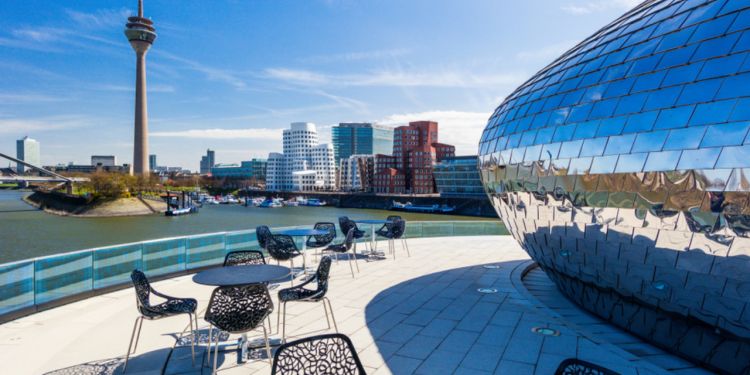
As the capital city of North Rhine-Westphalia state (which borders Belgium and the Netherlands to the West), Düsseldorf is one of Germany's major cities. Düsseldorf's population amounts to around 640,000 people in an urban area of over one million residents. Apart from being an important international financial and business hub, Düsseldorf is also world-famous for its commercial fashion industry, for which it has gained the nickname "Little Paris".
North Rhine-Westphalia has one of the strongest economies in Europe, mainly since the region is also Europe's most significant energy hub. Hence, it is expected that jobs in Düsseldorf will be up to a great extent in the energy sector. Nevertheless, Düsseldorf holds a strong cultural image, attracting travelers from all over the world due to the many events that are held in the city.
Düsseldorf's economy
In 2024, the unemployment rate in Düsseldorf is 8.7%, according to the Federal Employment Agency. As we have seen in other states and cities in Germany, unemployment among women is higher. The state's economy has mostly suffered in the civil service and hospitality sectors. North Rhine-Westphalia has about 18 million inhabitants and contributes 20.5% to Germany's GDP, meaning that it is among the strongest regions in the country.
Düsseldorf's economy is mainly based on energy, biotechnology, microtechnology, nanotechnology, information and communication technology, automotive manufacturing, logistics, trade, chemistry, plastics and new materials manufacturing. Also, the port of Düsseldorf on the Rhine River has been transformed into a new business area with cargoes transferring agricultural products, construction materials, fertilizers, chemical products, metals (e.g., iron, steel, ore), and oil and gas.
In addition, the city has tremendous creative potential directed in the fashion and media industries. Düsseldorf has more than 4,000 companies in the creative industries, with many of them being advertising agencies, such as Saatchi & Saatchi and Gray Worldwide. The creative atmosphere of the city can be seen in every part of it — from its architectural landmarks (e.g., the Rhine Tower and the Pebble's hotel) and cultural buildings (e.g., Düsseldorfer Schauspielhaus theatre and the K21 in the Ständehaus) to its fashion boutiques and art exhibitions.
Düsseldorf is one of Germany's top telecommunication centers hosting the headquarters and subsidiaries of many big German national and international firms, such as Vodafone, E-Plus, Huawei, and Ericsson. EON, Metro, Eurowings, Henkel, Rheinmetall, Esprit Holdings, Trivago, and Peek & Cloppenburg are also based there. Many companies — including in the financial and insurance sectors — are foreign-registered companies. There are also around 170 financial institutions, over 130 insurance companies,
Good to know:
Over the years, local authorities have implemented a series of economic and trade policies to attract foreign investors. For instance, over 500 Chinese companies (e.g., Huawei) have set up offices in Düsseldorf.
The labor market in Düsseldorf
Düsseldorf's labor market is very open and dynamic. Regarding international talent, expatriates can be hired in various fields, particularly in the industrial sector, financial services, trade, information and communication technology, automotive manufacturing, and energy. Job seekers in Düsseldorf, for their part, are more interested in healthcare and medical positions, architecture, transportation, and tax advice services. Another sector that is firmly rooted in Düsseldorf is legal and business consultancy. There are many company consultants based in Düsseldorf, including well-known companies such as McKinsey & Company, the Boston Consulting Group, and Deloitte Consulting. McKinsey employs over 3,200 people throughout Germany, and Düsseldorf holds the highest employment share in the consulting industry. Lawyers are also among the most widely represented occupational groups, with patent attorneys in particular in demand in the city.
Good to know:
Dusseldorf is very open to entrepreneurs and those wanting to establish a startup. In fact, there are many grants available to promote your business. Startup Dorf, for example, is a network that helps create a good environment for startups through regular events, meetups, and classes.
Useful link:
Finding a job in Düsseldorf
Start your job search in Düsseldorf by checking out general and specialized job websites, as well as classified ads in local newspapers. Take the time to send spontaneous job applications to big German and international companies operating in the city. Nevertheless, keep in mind that German companies will most likely require a good command of German. Registering with a recruiting agency or a temporary employment agency may also help, especially if you are looking for junior roles or vocational jobs.
Here are some tips for finding a job in Düsseldorf:
- Include in your CV your extracurricular activities, as they speak about your personality and readiness to work and can land you a good part-time job;
- Present a well-organized CV with a professional picture and a clear separation between the information regarding your studies and work experience;
- Apply for jobs reserved for international applicants;
- Be persistent, and go to as many interviews as possible, even if you don't always think you are the perfect match for the role.
Work experience in Germany is valuable all over the world. Düsseldorf offers a wide range of job opportunities in many fields, making the city an attractive place for international talent.
Useful links:
We do our best to provide accurate and up to date information. However, if you have noticed any inaccuracies in this article, please let us know in the comments section below.








